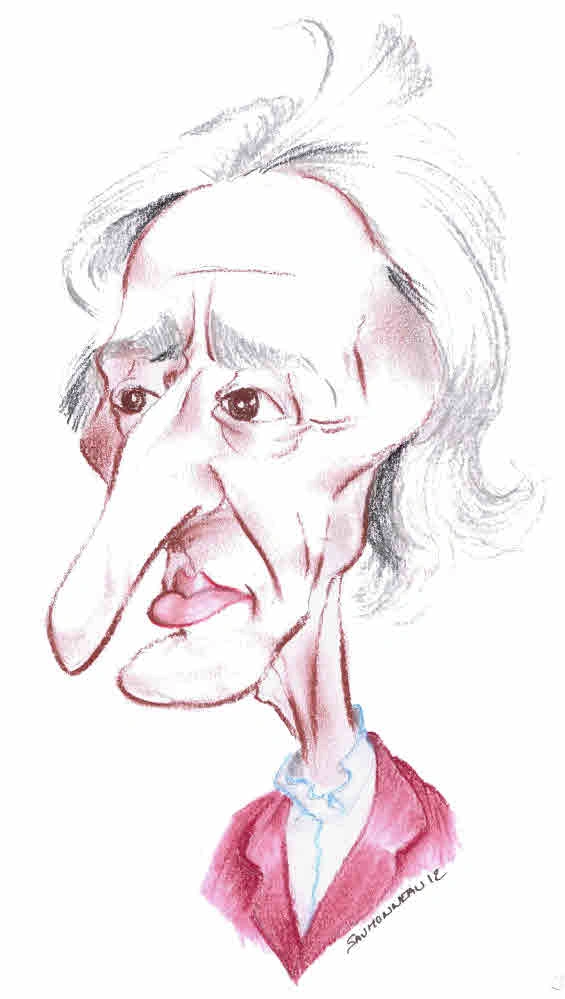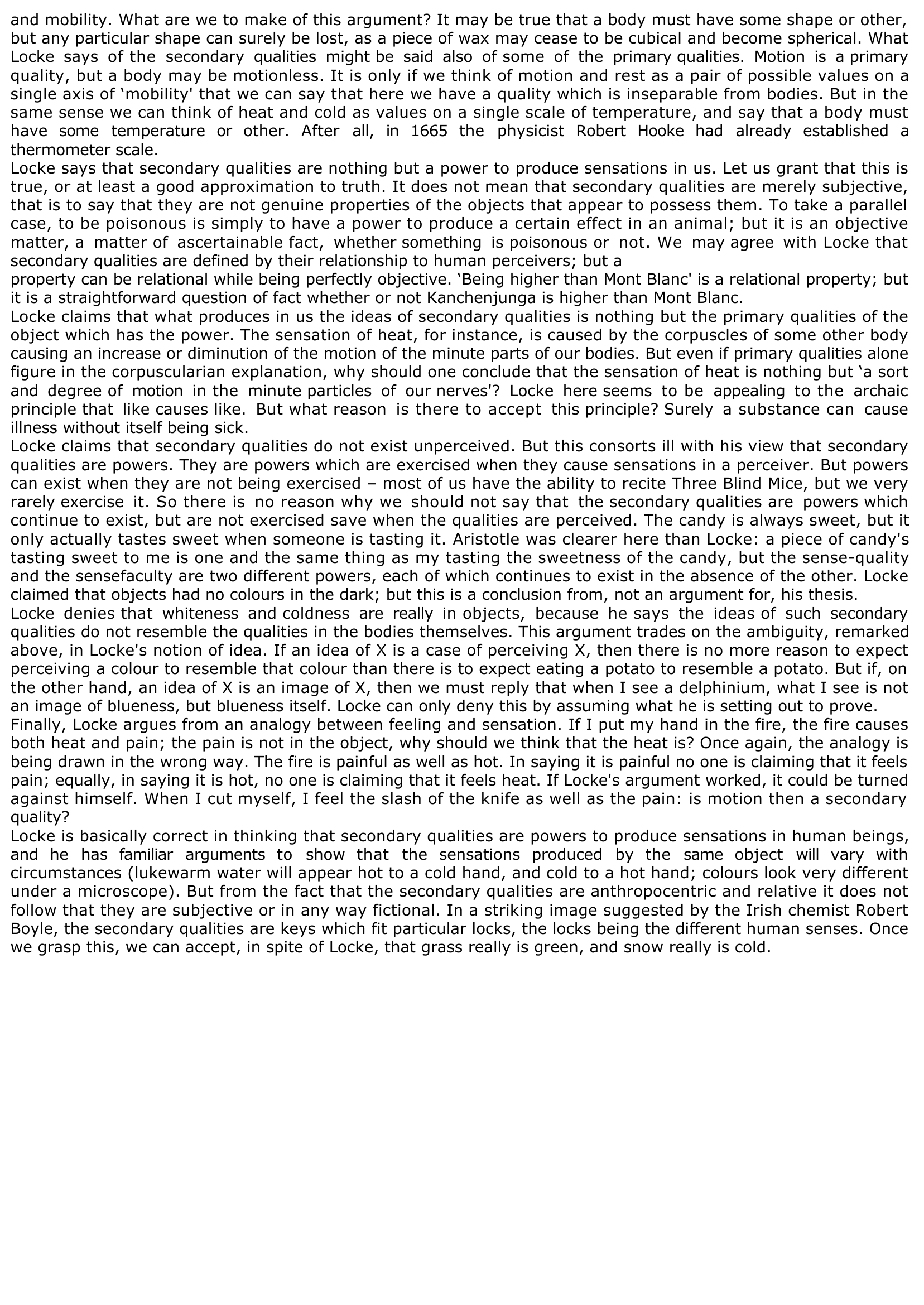Locke on Ideas and Qualities
Publié le 09/01/2010

Extrait du document

Locke's influence was by no means restricted to the political sphere. His Essay Concerning Human Understanding is often regarded as the foundation charter of a particularly British school of philosophy. Historians of philosophy often contrast British and continental philosophy in the seventeenth and eighteenth centuries: the continentals were rationalists, trusting to the speculations of reason, and the British were empiricists, basing knowledge on the experience of the senses. Descartes and Locke are often put forward as the founding fathers of these two opposing schools. In fact, in spite of the differences between them, the two philosophers share a lot of presuppositions, as we can see if we examine the famous controversy over the possibility of innate ideas, which was supposed to be the touchstone of the conflict between rationalism and empiricism.

«
and mobility.
What are we to make of this argument? It may be true that a body must have some shape or other,but any particular shape can surely be lost, as a piece of wax may cease to be cubical and become spherical.
WhatLocke says of the secondary qualities might be said also of some of the primary qualities.
Motion is a primaryquality, but a body may be motionless.
It is only if we think of motion and rest as a pair of possible values on asingle axis of ‘mobility' that we can say that here we have a quality which is inseparable from bodies.
But in thesame sense we can think of heat and cold as values on a single scale of temperature, and say that a body musthave some temperature or other.
After all, in 1665 the physicist Robert Hooke had already established athermometer scale.Locke says that secondary qualities are nothing but a power to produce sensations in us.
Let us grant that this istrue, or at least a good approximation to truth.
It does not mean that secondary qualities are merely subjective,that is to say that they are not genuine properties of the objects that appear to possess them.
To take a parallelcase, to be poisonous is simply to have a power to produce a certain effect in an animal; but it is an objectivematter, a matter of ascertainable fact, whether something is poisonous or not.
We may agree with Locke thatsecondary qualities are defined by their relationship to human perceivers; but aproperty can be relational while being perfectly objective.
‘Being higher than Mont Blanc' is a relational property; butit is a straightforward question of fact whether or not Kanchenjunga is higher than Mont Blanc.Locke claims that what produces in us the ideas of secondary qualities is nothing but the primary qualities of theobject which has the power.
The sensation of heat, for instance, is caused by the corpuscles of some other bodycausing an increase or diminution of the motion of the minute parts of our bodies.
But even if primary qualities alonefigure in the corpuscularian explanation, why should one conclude that the sensation of heat is nothing but ‘a sortand degree of motion in the minute particles of our nerves'? Locke here seems to be appealing to the archaicprinciple that like causes like.
But what reason is there to accept this principle? Surely a substance can causeillness without itself being sick.Locke claims that secondary qualities do not exist unperceived.
But this consorts ill with his view that secondaryqualities are powers.
They are powers which are exercised when they cause sensations in a perceiver.
But powerscan exist when they are not being exercised – most of us have the ability to recite Three Blind Mice, but we veryrarely exercise it.
So there is no reason why we should not say that the secondary qualities are powers whichcontinue to exist, but are not exercised save when the qualities are perceived.
The candy is always sweet, but itonly actually tastes sweet when someone is tasting it.
Aristotle was clearer here than Locke: a piece of candy'stasting sweet to me is one and the same thing as my tasting the sweetness of the candy, but the sense-qualityand the sensefaculty are two different powers, each of which continues to exist in the absence of the other.
Lockeclaimed that objects had no colours in the dark; but this is a conclusion from, not an argument for, his thesis.Locke denies that whiteness and coldness are really in objects, because he says the ideas of such secondaryqualities do not resemble the qualities in the bodies themselves.
This argument trades on the ambiguity, remarkedabove, in Locke's notion of idea.
If an idea of X is a case of perceiving X, then there is no more reason to expectperceiving a colour to resemble that colour than there is to expect eating a potato to resemble a potato.
But if, onthe other hand, an idea of X is an image of X, then we must reply that when I see a delphinium, what I see is notan image of blueness, but blueness itself.
Locke can only deny this by assuming what he is setting out to prove.Finally, Locke argues from an analogy between feeling and sensation.
If I put my hand in the fire, the fire causesboth heat and pain; the pain is not in the object, why should we think that the heat is? Once again, the analogy isbeing drawn in the wrong way.
The fire is painful as well as hot.
In saying it is painful no one is claiming that it feelspain; equally, in saying it is hot, no one is claiming that it feels heat.
If Locke's argument worked, it could be turnedagainst himself.
When I cut myself, I feel the slash of the knife as well as the pain: is motion then a secondaryquality?Locke is basically correct in thinking that secondary qualities are powers to produce sensations in human beings,and he has familiar arguments to show that the sensations produced by the same object will vary withcircumstances (lukewarm water will appear hot to a cold hand, and cold to a hot hand; colours look very differentunder a microscope).
But from the fact that the secondary qualities are anthropocentric and relative it does notfollow that they are subjective or in any way fictional.
In a striking image suggested by the Irish chemist RobertBoyle, the secondary qualities are keys which fit particular locks, the locks being the different human senses.
Oncewe grasp this, we can accept, in spite of Locke, that grass really is green, and snow really is cold..
»
↓↓↓ APERÇU DU DOCUMENT ↓↓↓
Liens utiles
- SUBSTANCES AND PERSONS - LOCKE
- British History and Civilization: Political Ideas, the State and Society
- Ideology and Rationality in the History of the Life Sciences
- Relationship between religion, spirituality, and young Lebanese university students’ well-being.
- Commentaire de texte Locke: chapitre 18, du livre 4 des Essais sur l'entendement humain

































